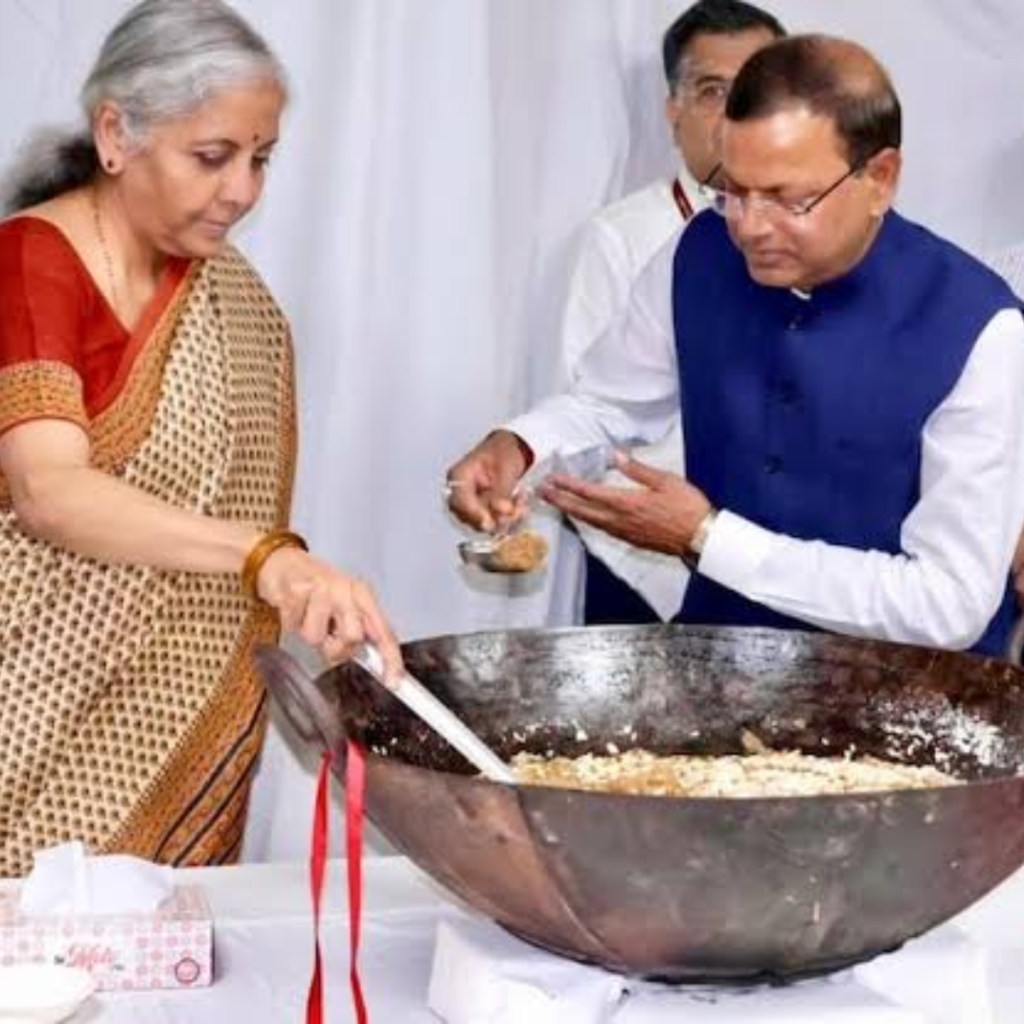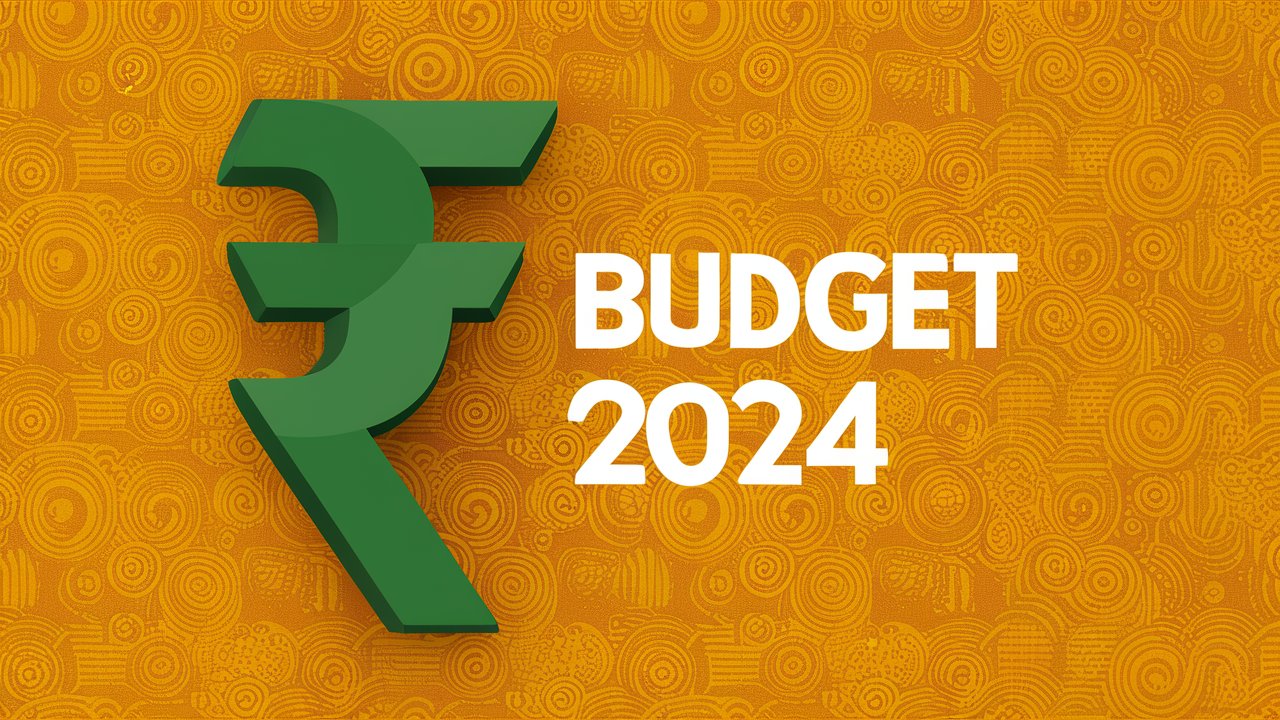On July 16, 2024, the corridors of North Block in New Delhi buzzed with anticipation as the traditional Halwa ceremony marked the final stage of preparation for India’s Union Budget 2024-25. This unique and symbolically rich event, attended by Union Finance Minister Nirmala Sitharaman and other key officials, signifies the beginning of the crucial ‘lock-in’ period for budget preparation. Let’s get to the highlights of 2024 Halwa Ceremony
The Halwa Ceremony: A Sweet Prelude to India’s Union Budget 2024-25
The Significance of the Halwa Ceremony
The Halwa ceremony is a time-honored tradition that has been an integral part of India’s budget-making process for decades. The ceremony derives its name from the sweet dish ‘halwa’ that is prepared and served to all staff members involved in the budget’s preparation. This gesture is not merely culinary; it carries deep symbolic meaning.

The exact origin of the Halwa ceremony is not precisely documented, but it has been a part of India’s budget-making process for several decades. The tradition is believed to have started in the 1970s, although some sources suggest it may have informal roots dating back to the British era.
The preparation and distribution of halwa symbolize the collective effort and teamwork required in crafting the nation’s financial blueprint. It also marks the commencement of the ‘lock-in’ period, during which the officials involved in budget preparation are sequestered within the Ministry of Finance. This isolation ensures utmost secrecy and prevents any leaks of sensitive financial information before the budget is presented to the nation.
The ‘Lock-in’ Process
Following the Halwa ceremony, key officials and staff members enter a period of seclusion that typically lasts about a week to ten days. During this time, they are cut off from the outside world, including their families. The officials work round the clock to give final touches to the budget documents, ensuring every detail is perfect before the big day.
This secrecy is crucial to maintain the integrity of the budget process and prevent any undue market speculation or manipulation based on leaked information. The lock-in process also symbolizes the government’s commitment to transparency and fairness in its financial planning.
Union Budget 2024-25: Expectations and Challenges
The Union Budget 2024-25, scheduled to be presented on July 23, 2024, comes at a crucial juncture for India’s economy. As the nation continues to navigate the post-pandemic landscape and global economic uncertainties, there are high expectations for this budget to address several key areas:
- Sustaining Growth Drivers: The budget is expected to focus on measures that can sustain and accelerate India’s economic growth. This may include initiatives to boost consumption, encourage private investment, and support key sectors of the economy.
- Fiscal Prudence: Given the increased government spending during the pandemic years, there’s an expectation for the budget to outline a clear path towards fiscal consolidation while balancing growth needs.
- Healthcare and Education: The pandemic has highlighted the need for robust healthcare infrastructure. The budget may allocate increased funds for healthcare and education, two critical areas for long-term national development.
- Infrastructure Development: Continued focus on infrastructure development is anticipated, with potential announcements on new projects and funding mechanisms for existing ones.
- Investment Climate: Measures to improve ease of doing business and attract both domestic and foreign investment are likely to be key focus areas.
- Digital Economy: With India’s rapid digitalization, the budget may introduce measures to further support and regulate the growing digital economy.
- Climate Change and Sustainability: Given global commitments and domestic needs, allocations for renewable energy and other green initiatives are expected.
- Agriculture and Rural Development: As a significant portion of India’s population depends on agriculture, measures to support farmers and rural development are likely to feature prominently.
Challenges and Considerations
While preparing the budget, the finance ministry faces several challenges:
- Global Economic Uncertainties: The ongoing global economic volatility, including inflationary pressures and geopolitical tensions, necessitates a cautious approach.
- Balancing Growth and Inflation: The budget needs to stimulate growth while keeping inflationary pressures in check.
- Job Creation: With a large youth population, creating employment opportunities remains a critical challenge.
- Revenue Mobilization: Expanding the tax base and improving tax compliance without burdening the common man is a delicate balance to maintain.
- Subsidy Rationalization: The government may need to address the issue of subsidies to manage fiscal deficit.
Opposition Demands Ahead of Union Budget 2024-25
INDIA Bloc Intensifies Pressure on Government
The INDIA bloc has intensified its demands ahead of the Union Budget session scheduled to begin on July 22. TMC leader Derek O’Brien has listed out several demands before the NDA-led central government.
Key Demands from the Opposition
Tax and Economic Relief
- Hike in the standard deduction limit for salaried taxpayers
- Reduction in GST rates on essential items
Rural and Agricultural Focus
- Increased allocation for the rural job guarantee scheme, MGNREGA
- Higher allocation for the agriculture sector, including subsidies for fertilizers and seeds
Fuel and Commodity Prices
- Rollback of the recent hike in fuel prices
- Reduction in the prices of essential commodities
Employment and Health
- Comprehensive plan to address unemployment
- Substantial increase in the health budget
Support for MSMEs
- Special package for micro, small, and medium enterprises (MSMEs) to help them recover from the economic impact of the COVID-19 pandemic
Broader Economic Concerns
The opposition has also raised concerns about:
- Rising prices of essential commodities
- Need for a more inclusive and equitable economic growth strategy
They have criticized the government’s handling of the economy and demanded a more transparent and accountable fiscal policy.
Conclusion
As India awaits the unveiling of the Union Budget 2024-25, the Halwa ceremony serves as a reminder of the meticulous process and dedication that goes into shaping the nation’s financial roadmap. The budget is not just a statement of accounts but a vision document that reflects the government’s priorities and its strategy to address the country’s economic challenges.
The success of this budget will be measured by its ability to navigate the complex economic landscape, address the needs of various sectors and demographics, and set India on a path of sustainable and inclusive growth. As the nation’s eyes turn to Finance Minister Nirmala Sitharaman on July 23, 2024, the sweet taste of halwa will linger as a symbol of the collective hope for a prosperous future.



